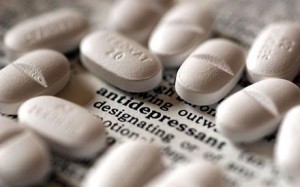By Mary West
Guest Writer for Wake Up World
Are anti-depressants over-prescribed? Do they really work? Are they dangerous to those who take them? To society at large?
Let’s take these questions one at a time, examining the evidence.
Are Anti-Depressants Over-Used?
Anti-depressants are currently the most frequently prescribed drugs in the US, soaring by 400 percent over the past two decades according to the Centers for Disease Control and Prevention (CDC). Does this reflect appropriate treatment or over-medicalization? In a debate on the issue published in the January 22, 2013 issue of the online British Medical Journal, Dr. Des Spence, a Glasgow general practitioner, believes these drugs are over-prescribed due in part to the present definition of clinical depression — experiencing low mood for a period of two weeks. He says this definition is “too loose,” noting that 75 percent of those who formulate these definitions have ties to the pharmaceutical industry.
[pro_ad_display_adzone id=”110028″]
The Effectiveness of Anti-Depressants is a Myth
In a fascinating study published in Philosophy, Ethics and Humanities in Medicine (PEHM), researchers set out to determine if the effectiveness of anti-depressants was a myth.
Their eye-opening findings reveal the un-trustworthiness that pervades the drug review system. Although medical literature reports several hundred anti-depressant clinical trials that yielded “positive” results, the PEHM’s closer analysis shows a different story. Here is what they found:
- Clinical trials that received negative results were either not published or were distorted.
- The benefits were exaggerated, as positive results of a small magnitude were reported as being large.
- The only genuine benefit of anti-depressants was found in a tiny minority of patients who had very severe depression.
The so called “evidence” supporting the effectiveness of anti-depressants did not hold up to the scrutiny of higher standards and careful examination. Researchers who had presented a rosy picture of the effectiveness of these drugs had misinterpreted the significance of statistics and manipulated the design of the studies, as well as distorted the reporting of findings and selectively picked study populations based on bias. All of these blatant breaches in ethics have nourished a myth that these drugs alleviate depression.
Anti-Depressants are the Common Denominator in Mass Shootings
A chilling link between anti-depressants and murderous violence is pointed out by Lawrence Hunter of the Social Security Institute who states, “In virtually every mass school shooting during the past 15 years, the shooter has been on or in withdrawal from psychiatric drugs.” The common denominator among the perpetrators of this violence is anti-depressants. Moreover, John Hinckley, Jr., Ted Kaczinski and the Amish school killer Charles Carl Roberts IV were all under the influence of these medications where they committed their criminal acts.
Psychiatrist Peter Breggin relates to Fox News that depression rarely leads to violence. He explains that murders and mass murders associated with depression have only occurred after the advent of a certain class of anti-depressants. Furthermore, the Physicians’ Desk Reference, which is an authoritative source of drug information, lists suicidal and homicidal ideas as hazardous side effects of these drugs.
The prevailing mindset is that anti-depressants are relatively harmless medications that elevate mood. In reality, they are mind-altering, potentially dangerous drugs that only offer a benefit to those who are very severely depressed.
Sources:
- http://www.sciencedaily.com/releases/2013/01/130122191404.htm
- http://www.thenewamerican.com/usnews/crime/item/14335-drug-induced-murder-what-caused-the-connecticut-school-shootings
- http://www.peh-med.com/content/3/1/14
Previous articles by Mary West
- 4 New Reasons to Avoid Pesticides
- You May Be Fueling Your Depression With These Drinks
- Toxic Gene Discovered in GM Crops Shows Approval Process Is Fatally Flawed
- 5 Newly Discovered Health Powers of Asparagus
- Coconut Oil Could Help Fight Tooth Decay
- 8 Ways to Maximize Telomere Length and Increase Life Expectancy
About the author:
Mary West is a natural health enthusiast, as she believes this area can profoundly enhance wellness. She is the creator of a natural healing website where she focuses on solutions to health problems that work without side effects. You can visit her site and learn more at http://www.alternativemedicinetruth.com. Ms. West is also the author of Fight Cancer Through Powerful Natural Strategies.
This article was republished with permission from Live in the Now, one of the fastest growing natural health newsletters. Visit LiveInTheNow.com to browse their complete library of articles, or join the nearly 60,000 readers subscribed to their Newsletter.
Disclaimer: This article is not intended to provide medical advice, diagnosis or treatment.
[pro_ad_display_adzone id=”110027″]







